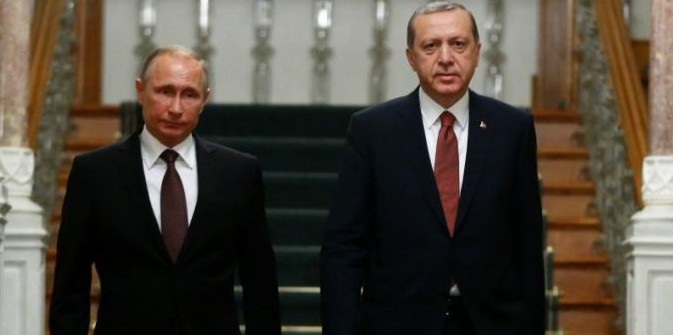Turkey and Russia standing v. Assad regime and Iran over fate of opposition-held Idlib Province?
LATEST
Turkish President Recep Tayyip Erdoğan and Russian counterpart Vladimir Putin have conferred again over Syria’s conflict.
Turkish media said the Saturday call was over the latest developments in opposition-held Idlib Province in northwest Syria, where the two countries have declared a “de-escalation zone”. The discussion comes ahead of their next meeting, along with Iran and delegations from the Assad regime and the opposition, in the Kazakh capital Astana.
Earlier this month, Turkey sent in some personnel to uphold the de-escalation zone, declared in September at the Astana talks by Moscow, Ankara, and Tehran. The plan called for 500 Turkish forces inside the province, held by the opposition since spring 2015, and 500 Russians on the borders.
Ankara is also using the deployment to put its forces on the frontline with the Kurdish-held Afrin canton, blocking any Kurdish aspirations for a contiguous autonomous region across northern Syria.
Despite formally participating in the Astana declaration, Iran is uneasy about the agreement confirming opposition-held territory and a de facto partition of Syria. The Assad regime has declared that it will retake the area, although this appears unlikely without Russian participation in air operations.
Russia and the regime continued to bomb Idlib after the September announcement, killing more than 200 people, but the strikes have eased in recent weeks.
Turkish reports said Erdoğan and Putin, who reconciled in summer 2016 after months of conflict including Ankara’s downing of a Russian warplane near the Syrian-Turkish border, also cooperation in the energy sector and the boosting of trade.
Rebels Pledge Help to Get Aid to Besiged East Ghouta
The rebel faction Jaish Al-Islam said on Saturday that it is ready to work with all humanitarian organizations to get aid into East Ghouta near Damascus, where residents are facing starvation after the tightening of the Assad regime’s four-year siege.
The faction said in its statement:
Jaish al-Islam denounced “the repeated harassment of the Assad gangs of these convoys”, including shooting at vehicles as they tried to pass checkpoints. It said, that working with groups including the Red Crescent, it had tried to evacuate the wounded and ill but had been blocked on all occasions by the regime, except for the exit of nine people.
Doctors and activists are warning of starvation and malnutrition, especially among children, after the Assad regime closed smuggling tunnels in March and closed the last checkpoint for passage of goods in July. One doctor said one person per day is dying because of the siege, with the toll likely to rise.
The UN children’s agency UNICEF said last week that at least 1,200 children in eastern Ghouta now suffer from malnutrition with 1,500 others at risk.

